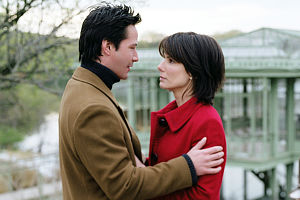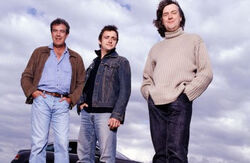
Continued from the full review of the movie Lake House.
This movie is unique gem. It is deep. Deep in a very unique way. It is so because it requires you to accept it for what it is, for you to truly appreciate it. Analyzing it while watching it for the first time spoils the movie experience. Thinking about it after the movie only enhances the experience. It's like waiting for the other person to finish speaking before replying. An old custom we may have lost, in our desire to assert ourselves and our opinions.
The way the movie progresses is also unique. The movie's timeline is not chronological (that is, it follows the progression of time) nor is it sequential but in a way 'consequential' - it is a series of events that is affected by the result of the events shown before it. In that way, it is very interesting. Things happen within Alex's and Kate's realm of experience. The relationship develops through the series of events they both live through in their own seperate times. While similar movies that deal with twisted timelines like the Twelve Monkeys creates a loop, at the end, this movie breaks it. In the movie Twelve Monkeys starring Bruce Willis and Brad Pitt, Bruce is set back in time to prevent a disaster. He soon realizes that he unwillingly plays a part in the formation of the disaster and at the end doesn't know whether he was sent back to prevent it or rather ensure things went the way they were supposed to, thereby creating a loop in the chronology of events. The Lake House ends with Kate breaking the loop. But wait, doesn't that cancel off what happens for most of the movie? Interesting though but really, it doesn't matter becuase it is their experience that they are living through. If you thought of things from the other people's point of view, it does get convoluted, especially for Alex's brother. But of course, the story isn't about him.
I have a theory that what Ben would say to Kate changes, that his brother Alex suddenly leaves on Valentine's Day 2006 and has not been heard since until the end of the movie. And like I said in the other post, if you could bend time and space, why not do it for love?
Critial of critics
I got online to read what other people are thinking about the movie and I read a lot reviews by the film critics. I don't do this much because I am very critical of critics. Some of the critics' reviews makes me mad because they didn't understand. They didn't even try to understand.. and yet they passed judgement. Is it fair to pass judgement on something you don't quite understand? Is it honest. If you are going to pass jugdement on something you don't understand, at least admit so.
I'll admit I may have missed some stuff but I think I got a good handle on the movie. It may not have been what the writer or director intended to convery but art has a way of becoming more than what is presented. So these are my takes on some of the confusion and critiques on the movie.
1. Why doesn't Kate (2006) just look Alex up on the Internet?
Let's say on the way to work, you meet someone at a park bench and strike up a conversation. You meet again, not necesarily the same day, but at the same bench and talk a bit more. This repeats itself a couple of times. You find yourself enjoying the converstation and later, the company, even if it was brief. What do you do next? Secretly follow that someone? Look them up to see they are who they say they are? If so, you do need help. Seriously. What if the other person did that to you? And you found out?
Kate and Alex did what most people would be doing, be polite. They enjoy the conversation, so why mess it up? Why mess up a good thing?
2. Why doesn't Alex make a move on Kate when met at her birthday party?
This is where Keanu's acting shines. The hesistation and uncertainty. The desire to connect (hence, mentioning the Jane Austen novel). He was not sure about dancing, Kate asked him for a dance. You see, Alex doesn't want just Kate. He wants 2006's Kate. 2004's Kate may not be ready or right for him. It not only has to be 'the right person' but also 'at the right time' for him. Also, I thought Alex would consider it rude, trying to steal someone's girlfriend.
3. Alex and Kate are shown talking or having a converstation across time. This is wrong?
Have a little imagination. Early the movies shows that it could be done literally, through short notes via the mail box. At times it is an abbreviation of sorts. Rather than being rigid and sticking to what is actually written on the notes, the story is told visually. Torwards the end, they know each other enought to be able to anticipate what the other would say and write their responses before hand. Some of these coversations, each side can stand on it's own but taken together they form a true converstation.
A circle of events
For those who are analyzing the movie logically, I am surprised that very few people picked the circular events that occur in the movie. This circle of events is key in their relationship. In fact, this where the impossibility of the story comes in, if you view time as a single strand or one series of events only. Let me recap.
- Kate and Alex begin their correspondence after she returns to the lake house. Her return is prompted by her anguish in failing to save Alex (she didn't know who it was then). But at the end of the story, upon learning that Alex died at the accident at Dealey Plaza, it made Kate realize suddenly, just as she said earlier, that life can be over in a moment. She realizes that she has lost someone she holds dear permanently. This sense of loss, one that she has put at an arm's length away (being a doctor and all), becomes very real. For once, she feels the loss of a life. The realisation that she is not be able to talk to this person again made her realize what she really felt for him. So she sends him a message asking him to wait 2 years and not go and see her at Dealy Plaza. So, if Alex didn't met the accident and died, Kate wouldn't have gone back to the lake house and begun her correspondence. (Having said that, I think she would have gone back eventually so their meeting was.. a matter of time)
- Kate's decision to move on with her life without Alex, prompts him to reasses his life and leads him to the decision to start Visionary Vanguard , a dream project he has with his brother. He leaves the lake house and rents it out to Kate (via her then boyfriend). She in turns falls in love with the house. Alex had to move out of the lake house for Kate to move in and appreciate it and later she would come back to it as a source of comfort. If she didn't set off the change, Alex wouldn't have left the lake house.
- Following that, it was at Visionary Vanguard that Kate found out what happened to Alex. Alex had to leave the lake house to begin Visionart Vanguard. If he hadn't started Visionary Vanguard, Kate wouldn't have gone there and met Alex's borther and would have gone on thinking she could still meet Alex someday.
Update: The movie is based on a Korean movie, "Il Mare".



